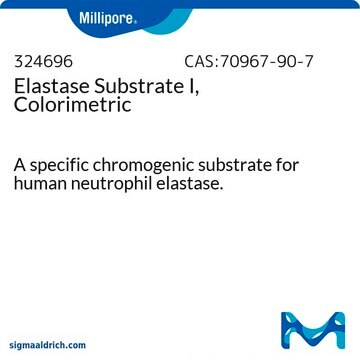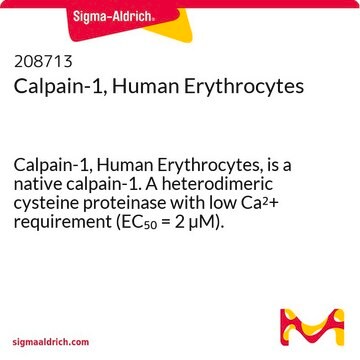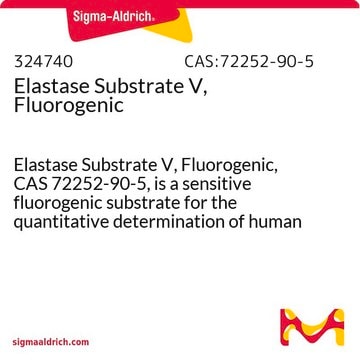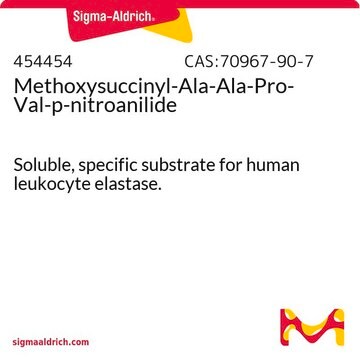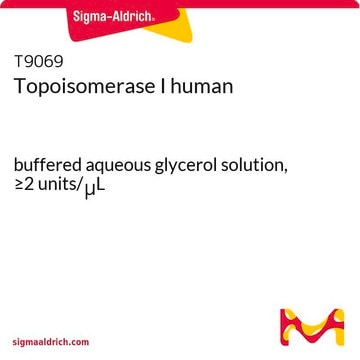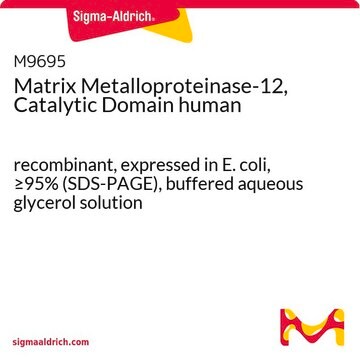This form of neutrophil elastase is a salt-free preparation and is supplied in an active form with a specific activity of ≥20 units/mg protein. It is not sterile and has not been tested for cell culture applications. To use it in a cell culture assay, sterile filtration is necessary, which may result in some product retention on the filter.
324681
Elastase, Human Neutrophil
Elastase, Human Neutrophil, CAS 9004-06-2, is a serine protease that degrades elastin, collagen, and proteoglycans
Synonim(y):
Elastase, Human Neutrophil
Wybierz wielkość
Wybierz wielkość
About This Item
Polecane produkty
Poziom jakości
opis
Merck USA index - 14, 3535
Formularz
lyophilized solid
aktywność właściwa
≥20 units/mg protein
producent / nazwa handlowa
Calbiochem®
warunki przechowywania
OK to freeze
Warunki transportu
ambient
temp. przechowywania
−20°C
Opis ogólny
Ostrzeżenie
Definicja jednostki
Postać fizyczna
Uwaga dotycząca przygotowania
Rekonstytucja
Komentarz do analizy
Inne uwagi
Junger, W.G., et al. 1992. Biol. Chem. Hoppe-Seyler 373, 691.
Selak, M.A. 1992. Thromb. Haemost.68, 570.
Baugh, R.J., and Travis, J. 1976. Biochemistry15, 836.
Informacje prawne
Hasło ostrzegawcze
Danger
Zwroty wskazujące rodzaj zagrożenia
Zwroty wskazujące środki ostrożności
Klasyfikacja zagrożeń
Eye Irrit. 2 - Resp. Sens. 1 - Skin Irrit. 2 - STOT SE 3
Organy docelowe
Respiratory system
Kod klasy składowania
11 - Combustible Solids
Klasa zagrożenia wodnego (WGK)
WGK 3
Temperatura zapłonu (°F)
Not applicable
Temperatura zapłonu (°C)
Not applicable
Certyfikaty analizy (CoA)
Poszukaj Certyfikaty analizy (CoA), wpisując numer partii/serii produktów. Numery serii i partii można znaleźć na etykiecie produktu po słowach „seria” lub „partia”.
Masz już ten produkt?
Dokumenty związane z niedawno zakupionymi produktami zostały zamieszczone w Bibliotece dokumentów.
Klienci oglądali również te produkty
-
Hi Is this form of neutrophil elastase active and suitable be used directly in a cell assay? And is it sterile ? Mvh Magdalena
1 answer-
Helpful?
-
-
Has this product been tested for the presence of endotoxin?
1 answer-
Unfortunately, this product has not been tested for the presence for endotoxins
Helpful?
-
-
what is the molecular wight of the enzyme ?
1 answer-
Unfortunately, the molecular weight has not been determined for this product. A number of estimates have been reported in the literature. Please see the link below to a publication that may be helpful:
https://www.sciencedirect.com/science/article/pii/S1016847823175091?via%3DihubHelpful?
-
-
Is this the active form of the enzyme? or does it require activation by cathepsin?
1 answer-
Here are the recommended reconstitution and reaction conditions:
Solubility information:
Reconstitute in 50 mM sodium acetate, pH 5.5, with 200 mM NaCl or in other aqueous buffers. Material is most active near a neutral pH, but to maintain stability upon reconstitution, use in a slightly acidic buffer (pH 5.5) to avoid autolysis.
Following reconstitution, aliquot and freeze (-20°C) for long term storage or refrigerate (4°C) for short-term storage. Acidic stock solutions are stable for up to 1 month at 4°C or for up to 1 year at -20°C.Human Neutrophil Elastase Protocol
1. Dissolve enzyme in reaction buffer: 100 mM Tris-HCl, pH 7.5, 500 mM NaCl.
2. Prepare the substrate stock solution by dissolving Elastase Substrate I (MeOSuc-Ala-Ala-Pro-Val-pNA, Cat. No. 324696) at 50 mM in DMSO.
3. Just prior to assay, dilute the substrate stock solution with an equal volume of 200 mM Tris-HCl, pH 8.0. Mix well.
4. Prepare the assay mixture by combining 960 µl of reaction buffer with 40 µl of diluted substrate stock solution.
5. Add enzyme to assay mixture, mix, and incubate at 25°C.
6. Monitor the change in absorbance at 410 nm. Use an ε of 8800 at 410 nm to calculate the hydrolysis of nitroanilide.Helpful?
-
Active Filters
Nasz zespół naukowców ma doświadczenie we wszystkich obszarach badań, w tym w naukach przyrodniczych, materiałoznawstwie, syntezie chemicznej, chromatografii, analityce i wielu innych dziedzinach.
Skontaktuj się z zespołem ds. pomocy technicznej
